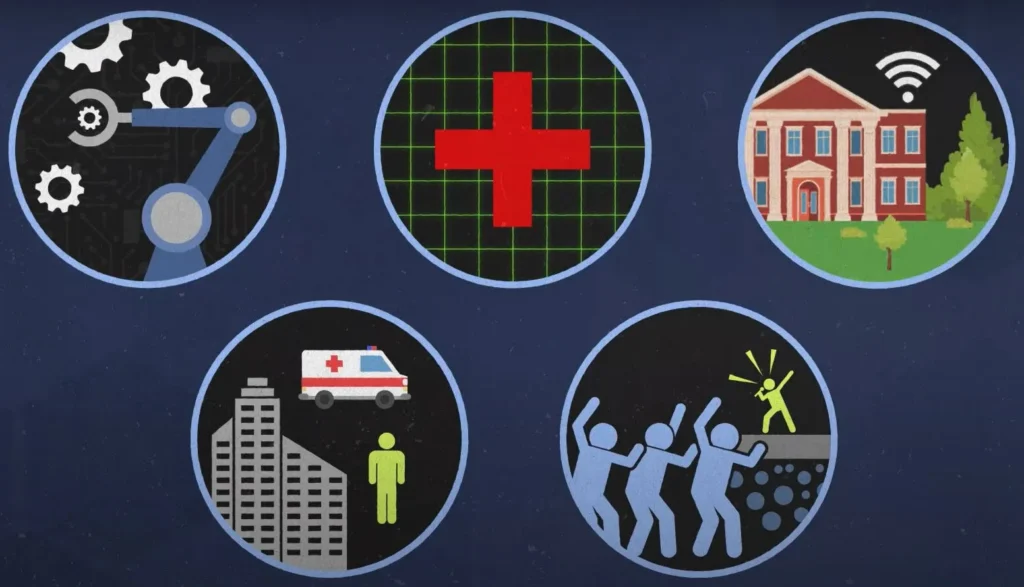It is well known that 5G, by enabling large-scale ultra-high bandwidth, ultra-low latency data communications. This makes it possible for technologies like robotics, augmented reality, and digital twins to work well. Since 5G is the first platform to transcend the telecoms sector, it is now considered an essential component of digitalization across the board. Additionally, private 5G networks exist. A significant adjustment with many advantages. Let’s explore this intriguing new trend that has the potential to transform everything.

Private wireless networks: What are they?
Similar to public wireless networks, private wireless networks offer wireless broadband connectivity, but they also have the advantage of being owned and managed by the company that installed them. In the past, enterprises had few choices when it came to implementing proprietary network technologies like Sigfox or LoRa or private wireless networks like Wi-Fi. These antiquated private networks worked well for basic industrial Internet of things (IoT) applications and for connecting laptops to the internet. However, they were challenging to use for sophisticated IoT applications due to their constrained security and range, incompatibility with public cellular networks, and expensive management costs.
Recently, many businesses have found that private cellular networks that make use of 4G and 5G technologies are a popular option. These networks are compatible with public cellular networks and offer the coverage, security, and additional features needed for advanced IoT applications. Furthermore, when compared to alternative wireless technologies, these networks frequently have lower long-term management costs.
The benefits of personal networks
Because private networks are exclusive and controlled, they have many benefits for businesses. They were developed to satisfy the demands of companies seeking the best possible performance and availability. The limitations of other wireless technologies and commercial providers are overcome by this solution—and we’re not even talking about wired solutions here. And there are a ton of main advantages.
Enhanced protection
Administrators have complete control over data management and routing in private cellular networks, which isolates sensitive data from other devices on the network. This removes the possibility that third-party providers will handle your data improperly or jeopardize its security.
Defaulting to encryption, the networks offer enhanced security and improved device identification compared to open without password or pre-shared key password-based Wi-Fi networks.
Particularized protection
Private cellular networks are made to specifically cater to the performance and coverage requirements of companies operating in various sectors and environments. To get the required coverage, businesses can combine rooftop antennas, indoor and outdoor access points, and small cells.
Private cellular networks, which use their own hardware to get around environmental restrictions in rural workplaces, enable cellular access in places where it would not be possible in sectors like manufacturing and energy. Businesses with a huge footprint or those with several buildings spread out over a large area will also greatly benefit from this.
Service levels that are assured
Administrators can guarantee that every application gets the resources it needs, including the precise latency and throughput requirements, thanks to private cellular networks. It offers more control over available resources than virtual LANs or standard Quality of Service settings.
Incredibly dependable connections
Large areas can benefit from private cellular networks because they offer a smooth transition between access points. For instance, you might not even notice when your phone shifts from one cell tower to another if you’re moving. For low-latency applications like autonomous vehicles and augmented reality, this dependability is essential. Private 5G networks offer the speed, capacity, and dependability that companies require to grow profitably. No matter where you work—in an office, warehouse, lab, or factory—your connections will always hold you up.
Unparalleled scalability
Private cellular networks, especially those used by larger businesses, can cover a greater area with less hardware and labor, enabling them to launch new services more quickly and improve customer outreach.

The operation of private networks
A private mobile network is a specialized network created to meet the unique requirements of a business in a specific area. It uses 4G or 5G technology and licensed, shared, or unlicensed radio frequencies. The company owns the infrastructure of these networks, which it combines with backend software to offer application-specific services and tailored mobile coverage. Furthermore, these private networks are frequently incorporated into the current WLAN to provide businesses with a dependable, low-latency network for critical devices and applications.
Considerations for private network security
A relatively new but increasingly popular technique for connecting devices on an enterprise network, such as employee laptops, autonomous robots, and tiny IoT sensors, is through private 5G networks. These networks provide many more advantages than what is currently provided by a standard Wi-Fi network.
Security features that guarantee the safety of data transmission in the air are built into 5G networks. Even more security is provided by closed, exclusive private mobile networks, but these systems are not impervious to cyberattacks. Working with seasoned providers is essential because of this. Upholding security is a difficult undertaking that calls for collaboration from every member of the organization’s ecosystem. To guard against potential cyber threats, suitable deployment, security, and management procedures must be followed with every new device added to the network. The variety of deployment scenarios and the growing number of 5G private networks raise the potential targets for cyberattacks. 5G Private Networks are among the safest and most resilient networks, even though no network is impenetrable to cyberattacks (especially compared to Wi-Fi).
Conclusion
When searching for dependable and secure connectivity solutions, businesses can reap numerous advantages from implementing private wireless networks. For IoT applications, they provide superior coverage, security, and sophisticated features. While private networks are by nature more secure than public networks, it is crucial for enterprises to collaborate with knowledgeable partners and employ automation and orchestration tools in order to efficiently administer and safeguard their network. Businesses must keep informed about emerging technologies and best practices as private wireless networks develop in order to maintain network security and customization for their unique requirements.